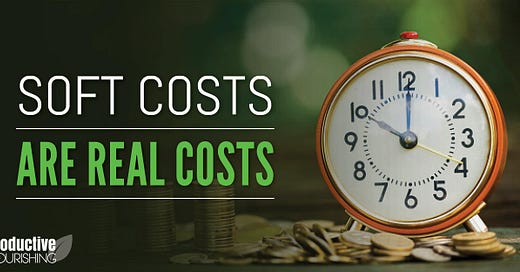Soft Costs Are Real Costs
People will spend an inordinate amount of time to save a few dollars. There's often a lightbulb moment that happens when you ask them to calculate their time-dollar value, because it reveals that they're spending more in soft costs than they're accounting for.
Take a second to think about it. If you spend 3 hours avoiding paying $12 for something – or researching whether you should – yes, you've saved money, but you've also been working at $4 per hour. If you're an entrepreneur, your time is worth more than $4 per hour, and while your choice has saved a "hard" cost (money), you've spent more in "soft" costs (your time). Energy and attention are two other soft resources we need to be thinking about, too.
Soft costs are just as real as hard costs. In that 3 hours, you could have been doing $300 worth of revenue-generating, high-value activities. A more complete picture is that you've spent $300 to save $12.
It's a bit different when you're employed by someone else, as you'll make the same whether you spend 3 hours or 30 minutes to get something done. At least in the short term. The people who actively add more value to their organization before being paid to do so are the ones most likely to get a promotion or advancement that honors their contributions because they show up in a different way.
Outside of "work" situations, think about how much time you spend doing things you'd rather not do, like cleaning your house. Is it worth $100 to not have to spend your weekend cleaning your house? (Question the assumption that you "should" do that if it's coming up for you. Why should you clean your house any more than you should fix your car?)
The next time you're thinking of making a decision that involves hard costs, also consider the soft opportunity costs of what you're currently doing. No decision is made in a vacuum.
Keeping costs down is always a great thing to focus on. Just make sure that your focus on keeping costs down isn't also keeping your revenue or earning potential down. (Tweet this.)
In my experience, this is something we have to learn over and over again, especially as costs increase significantly. We accept that it's not worth our time to worry about $10, but when it's $100, we get cheap again. Then when it's $1,000, we get doubly cheap. Our ability to accept and acknowledge changes in our revenue or earning potential outpaces our ability to be clear about costs.





